Bourke Ulick J. Easy lessons, or Self-instruction in Irish / Легкие уроки: самоучитель ирландского языка
Подождите немного. Документ загружается.

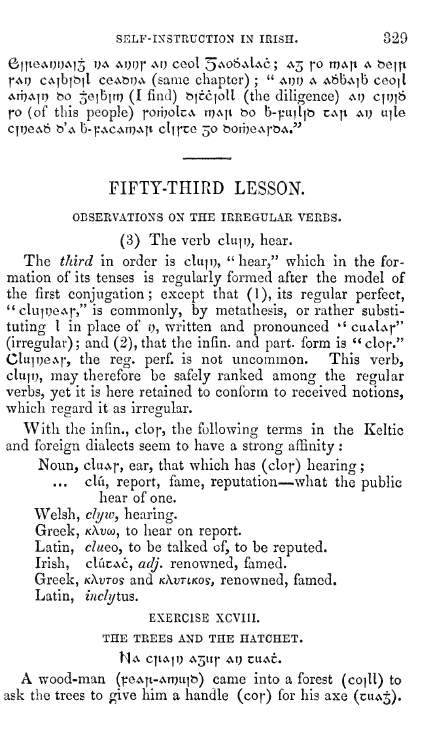
SELF-INSTRUCTION
IN
IRISH.
329
€/i|ie<M)i)A]5
i)<v
AX)\)Y
At}
ceol 3<^o^'^l'<^c^
; A5
^-o
tDAjt a be||i
^•At)
CA^bi&il
ceA&T)A (same chapter)
;
"
At)T)
a
AÓbAjb ceo|l
ArbA]r)
ho
5eibitT)
(I
find)
hjCCioU
(the diligence)
At;
C]t;]6
yo
(of this people)
foti^olcA
tT)A|i ho
b-|:u]li&
CAjt At)
u]le
C]t)eAÓ
&'a
b-pACAiT)A|i
cli]*ce
50
bonje^yti^."
FIFTY-THIRD
LESSON.
OBSERVATIONS
ON
THE IRREGULAR
VERBS.
(3)
The verb
clujt;,
hear.
The
third
in order is
clu]t;,
"
hear,"
which in
the
for-
mation of its
tenses
is regularly formed
after the
model
of
the first conjugation; except that
(1),
its
regular perfect,
"
cluiueAf,"
is
commonly,
by metathesis, or rather
substi-
tuting I in place of
v,
written and
pronounced
"
cuaIaj*"
(irregular);
and
(2),
that the
infin.
and part, form is
"clof."
Clu]t;eAf,
the
reg. perf. is not uncommon.
This
verb,
cluit),
may therefore
be
safely ranked among
the
regular
verbs,
yet
it is here retained to conform to received
notions,
which regard
it as
irregular.
With
the
infin.,
clof,
the
following
terms
in
the
Keltic
and
foreign
dialects seem to
have
a
strong
affinity
:
Noun, cluA|*, ear, that
which has (clo|*)
hearing
;
...
clu, report, fame, reputation
—
what
the
public
hear
of one.
Welsh,
cli/io, hearing.
Greek,
kAucu,
to hear on report.
Latin,
clueo,
to be
talked of,
to
be reputed.
Irish,
cliicAC,
adj. renowned,
famed.
Greek,
kXvtos
and
k)\.vtíkos,
renowned,
famed.
Latin, inclyins.
EXERCISE XCVIII.
THE TREES
AND THE HATCHET.
Ma
C]tA]t)
A5U|'
AT) CUAC.
A
wood-man
(feA|i-ATT)uib)
came into
a forest
(co]U)
to
ask the trees to
give him
a
handle (co|-) for his
axe
(cuas).
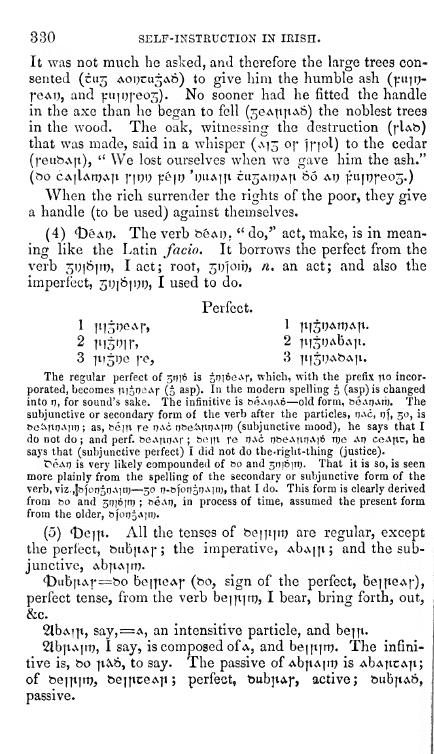
330 SELF-INSTRUCTION
IN IRISH.
It was not much he asked, and therefore
the large
trees con-
sented (C115 aoi)cu5a6)
to give
him the humble ash
(fruir)-
feAU,
and
puiu|'eo5).
No sooner had
he fitted the
handle
in the axe than he
began to
fell
(^eAiajtAO)
the
noblest trees
in the wood.
The oak,
witnessing the destruction
(flAfc»)
that was made, said
in a
whisper
(ai3 of
']y]o\) to the cedar
(í*eubA|t),
"
We lost
ourselves when
we
gave him
the ash."
(bo
CAilArt^Aji
]*|T)i) p&|r)
'uiiAiJi
cii5An)<\|i 60
atj
fu]r)yeo-^.)
When
the rich surrender the
rights
of the poor, they give
a
handle
(to
be
used) against
themselves.
(4)
<t)&Ar). The
verb
b&At),
"
do/' act,
make, is
in mean-
ing like
the
Latin
facto.
It
borrows the perfect from the
verb
^]-)]6]rv,
I act;
root,
^v]ow,
n. an act; and also
the
imperfect,
5T;|6ii:)t>,
I
used
to
do.
Perfect.
1
msDCAr,
1
|t]5t)ATi7A|t.
3
]ti5i)e
|-e,
3 |ti5i}AbA|i.
The regular
perfect
of
50)6
is
enioeAf,
which, with the prefix y\o
incor-
porated,
becomes
iHoHeAr
(5
asp).
In the
modern
spelling
5
(asp)
is changed
into
t),
for sound's sake. The
infinitive is seAnAo—
old form, beAtjAit).
The
subjunctive
or
secondary
form of
the
verb after
the particles,
r)^\c,
of,
50,
is
&eX.\TinAiti) ; as,
bem
re
r).\c
n&eC\nnAl")
(subjunctive mood), he says that
I
do not
do; and perf. feeAtirjAr
;
t>c]\\
re
dac
n&eAnnAió
rtje
Arj
ceA|xc,
he
says that
(subjunctive perfect)
Í did
not
do
the-right-thing
(justice).
t^eAi)
is very
likely compounded of
&o and
snjójn).
That
it
is so,
is seen
more
plainly
from
the
spelling
of
the
secondary or subjunctive form
of the
verb,
viz.,|t)for)or)A]tt;
—
50
o-bfopsriAin),
that I do.
This
form is clearly derived
from
bo
and
5nió|rn
;
béAt),
in
process
of
time, assumed the
present
form
from
the older,
sfotjaAinj.
(5)
<t)e]|t.
All
the tenses
of
bei|t|rt)
are
regular,
except
the
perfect,
bubitAi*
;
the
imperative,
AbAi|t
;
and the
sub-
junctive, Ab|tA]n7.
í)iibitAr=bo bei|ieA|*
(bo,
sign
of the perfect,
benteAf-),
perfect tense,
from the verb
be]]t]n7,
I bear,
brinsr
forth, out,
&c.
2lbAi|i,
say,=A,
an intensitive particle, and be]|i.
2lb|iAiii7,
I say, is
composed ofa, and
beift|rt7.
The infini-
tive is,
bo
jiívó,
to say. The
passive of
AbftAirt?
is
AbATtcAji;
of
be]|titi7,
bei|tceA|i
;
perfect,
bubjiAf,
active;
bubjtAÓ,
passive.
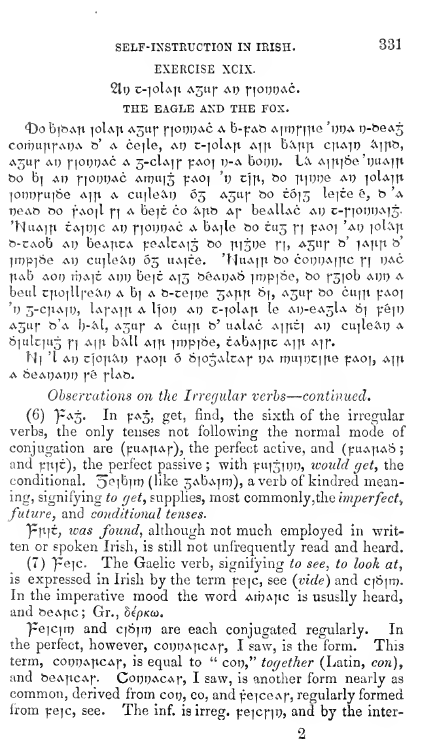
SELF-INSTRUCTION IN
IRISH.
331
EXERCISE
XCIX.
2lt)
C-^oU|t A5U|* AT)
|*l017t)AC.
THE EAGLE AND THE
FOX.
«Do b]bAit
plAji
A5Uf
powAC A
b-|:A&
Ajrnf
i|te 'i)T)a
tj-beAJ
con}uftfAr)<v
&'
A
ce]le, Ar)
c-]olAft
a]|i
bivjaji
ctiAlt)
4v]]t&,
A5Ur
AT) ]*|OI)r)AC
A
5-clA]f
^AO]
T)-A botjl). LíV
A]]a]6e
'l)UAT|l
bo b]
An
|*ior)ijAc
Art)ii]5 ^ao] 't)
ci|x,
bo
|i]i)De
At)
joIaiii
\or)r)yii]6e
A]]\
a cuile^i)
05
A3U}*
bo
có|5
le^ce
é,
b
'a
DeAb
bo
f..\0]l
X]
A be]c
co
4viib a]*
beAlUc ai)
c-|*iot)i)Ai5.
'MuA1]t CA]t)]C Al)
f]0T)t)AC
A
b<X]le bo
CH5
X]
X'SO]
'aI)
]0líV|l
b-cAob
Ai) beAjxcA ^eAlcA]5
bo
Ttl3f^^
T*!»
^3"r
^'
}^W
^'
irT)p]6e
Ai) cu]le^t)
05
uA]ce. 'MuA]|t
bo
coi)t)Ai|ic
y]
t)AC
|XAb AOt)
rpAic
Ai^T) be|C
ai5
béAtjAÓ ]n)p|6e,
bo
fSjob
At)T)
a
beul
c|to|llfeivr)
a
b|
a
b-cej^e
3A]t|t
6|,
A5Uf
bo cu|]a
|:ao]
't)
5-C|tAin,
lAfA]|t A
IjOr) At) C-^olAjt
le
AT)-eA5lA
6]
fé|1)
A5uf
b'A })-is.l,
A51X]*
A
cu]|t b' uaIac
AlltC]
AI) CU]le^T) A
b]iilc|ii5
Y]
A|]a bivll
Ai^ impjbe,
CAbAntc
ai|i
a^i*.
H|
'I
AI)
c]o|iivr)
fAOji
5
ó]05AlcAf
i)A
n)upcifte
pAO], A]|t
A
6eAt)Ai)r) |*é
|*lAb.
Observations
on
the
Irregular
verbs
—
continued.
(6)
p^^S-
lí^
F^5»
gst,
find,
the
sixth of the irregular
verbs,
the
only tenses not
following
the normal
mode
of
conjugation
are
(puAjtAf),
the perfect active, and (pua|ia6
;
and
pTilc),
the perfect
passive
;
with
pui5iT)r),
luould
get,
the
conditional.
'^e]h]nj (like 5AbA]rt)),
a verb of
kindred
mean-
ing, signifying
to
get,
supplies, most
commonly,the
imperfect^
future,
and cojiditional
tenses.
y-^ijt,
was
fo2ind,
although
not much employed
in
writ-
ten
or
spoken Irish, is still not
unfrequently read
and
heard.
(7)
peic.
The
Gaelic
verb, signiiying
to see,
to look
at,
is expressed
in Irish
by
the term pe]c,
see
(vide)
and c]6]n).
In the
imperative
mood the
word Anxxjtc is
ususlly
heard,
and beA]tc;
Gr.,
bepnco,
"peicin)
and
cióin)
are
each
conjugated
regularly.
In
the perfect,
however,
cor)r)A|tcAf,
I
saw,
is the
form. This
term,
cooDAjtcAf,
is
equal to
"
cot),"
together
(Latin, con),
and
beA|tcA|*.
Cot)t)ACAr,
I saw,
is another
form
nearly
as
common,
derived
from
cot),
co,
and
f
e]ceA|-, regularly formed
from
^e^c,
see. The inf.
isirreg.
pe]cni?>
and
by the inter-
2
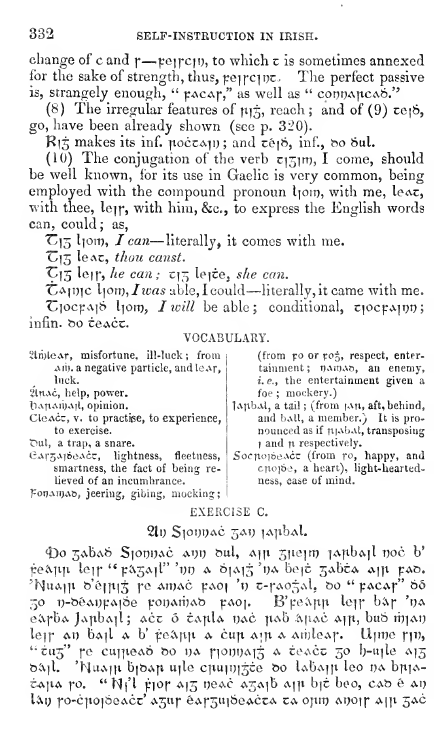
332
SELF-INSTRUCTION
IN IRISH.
change
of
c and
y
—
ife^yciv,
to
which
c
is
sometimes
annexed
for
the sake
of strength,
thus,
^eTf*cir)c.
The perfect
passive
is, strangely
enough,
"
^acaí*," as well
as
"
cprjoAjtcAO.'^
(8)
The
irregular
features
of
1x15,
reach
;
and of
(9)
cei6,
go, have
been
already
shown
(see
p.
320).
K15
makes
its inf.
iiocca^i)
;
and
cefo,
inf., bo
8ul.
(10)
The
conjugation
of the verb r]'^^rr),
I
come, should
be
well
known,
for its
use in Gaelic
is
very common, being
employed
with the
compound pronoun
liorn,
with me,
leAc,
with
thee,
leif,
with
him,
&c., to express the
English words
can,
could;
as,
'C]5 l]on),
J
can
—
literally,
it comes
with me.
'C15
leAc,
thou canst.
p13
^^ir»
^'^
^^'^."
^15
le^ce,
she can.
"CAirjic
l^orrj,
I
was able,Icould
—literally, it
came with
me.
T.]oc]:a]6
Ijoni, I
will
be able
;
conditional,
c]OCfA]ijo;
infin.
bo
ceACC.
VOCABULARY.
(from
po or jroj,
respect, enter-
tainment
;
TjAnjAO,
an enemy,
i.e.,
the
entertainment
given
a
foe
;
mockery.)
lA]abAl, a tail
;
(from
[An,
aft,
behind,
and
bAll, a member.)
It is pro-
nounced
as
if
niAbAl,
transposing
1
and
n
respectively.
SoctioióeAcc
(from
roj
happy, and
criojoe,
a
heart),
light-hearted-
ness, ease of
mind.
2lri)leAr,
misfortune,
ill-luck; from
Alt),
a
negative
particle, and
leAf,
luck.
21TIAC, help,
power.
liAtiAiijAjl, opinion.
CleAcc,
V.
to
practise, to experience,
to exercise.
t>ul, a trap,
a snare.
6Ar5AióeAcc,
lightness, fleetness,
smartness,
the fact
of being re-
lieved
of an incumbrance.
i^otjAnjAS,
jeering, gibing, mocking;
EXERCISE
C.
2lt) SlOljtJAC
5At) ]A]tbAl.
i)o
5AbA6
SioT)T)AC
Ai)T)
bul,
A]]i 5]ie]rt)
iA|tbAil
t)oc
b'
^eiv]i|i
leif
'«pivsAjl" 'tm
A
biAi5
't)a bejc 5AbcA
Ajjt
fAb.
'HiiA]|i
b'é(]tj5
ye
ArpAC y^O] 'xy
c-]*ao5v\1, bo
"
|:ACAf"
60
30
T)-b&Ai)pA|óe
f'otjArbAb
^ao], B'pe^\|t]t
ie]f
h'^y 't)A
e<x|*bA jv\|tbA]l
;
acc ó cajvIa t)ac |iAb
í\|iac a]|v,
biib
n)]AV
\e]y
AT) bAjl
A b'
^ei^itft
a
cu|t
A]it
a
ArrjleAf.
U.|rne
y]Vi
"
CU5"
|-e cui]ieAb
bo i)a
|*ioi)I)a]5
a
ccacc
50
b-u]le
a]5
bC\il.
'HuAjiv
b|bAit
U]l6
c]tu|ni5i:e
bo
lAbA]|i leo
t)A
bjtiA-
to^]XA
yo.
"
M|'l
y]oy
A15
tjeAC
ASA^b
a||v
b\t beo, CAb é
ai}
liVI)
^0-CjlO|ÓeACc'
A5Uf
éA|*5UlbeACCA CA OJITT)
AlJOlf AI|l
5AC
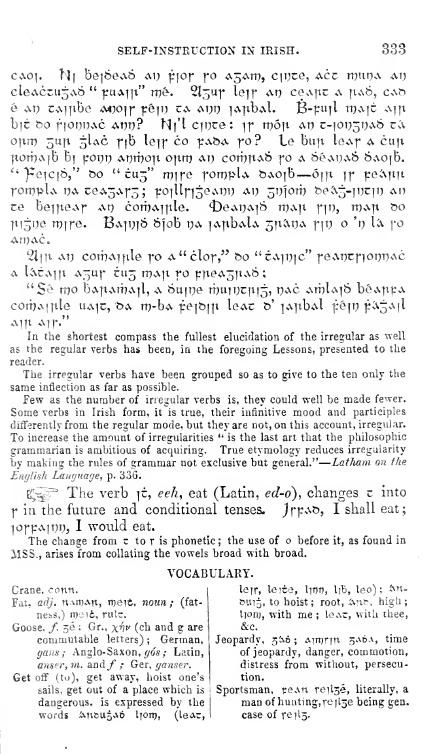
SELF-INSTRUCTION IN IRISH.
333
CAO|.
'Ni
be]6eAÓ
at?
p|Of
yo a5<mi7,
Cjuce,
j)^cc
rnur)A Ar)
cleACcu5A6
"
]:uAT|t"
rT)é^.
2l5ui*
le^r
^t)
ceA|ic
a
^iaó,
ca&
é at;
CAi|xbe
aíjo]^
f:é]i)
CvV ATjrj
^AjibAl.
B-p"]^
idajc
ai|i
b]C
bo
fiorjDAC
AUT)?
t^i'l
CjDce:
if
Tr)ó|i
An
c-|or)5t;A6 cCv
o\in) 5U|i
5IAC
|*ib leif
co
^a&a
f*o?
Le
bu]t
leAf
a
cujt
]tOTT)Alb
b] pOt)T)
Ar)TnO]l
0|tn7 AT)
COT^riAO
fO
A
ÓéAr)A6
ÓAOjb.
"
"peicjo,"
&o
"
CU5"
n)]Ye
fotDpU
bAOjb
—
ó||t
]y
^e<v|t|i
romplA r)A
ceA5A|*5
;
foiUfiJeAT^Tj
at)
stj^ott)
&ei\5-]r)qT)
ah
ce
beifteAf
at)
corbA]|tle.
<t)eAT)Ai6
rr)A|i
f^r),
n)A]i bo
|i15r)e
TTjife.
Ba]T)|ó Ójob t)a ^AjtbAlA
5|tivr)A
|*it)
o
't; liv j-o
An)AC.
2l|n
AT)
con)Ai|ile ]*o
a"cIo]',"
&o
^'•tA-\r)]c'
|*eAr)cnow<^c
A livcAiji
A5U|* CU5
rt)A|i ro
•pTteA5itAÓ
;
"Sé
TT)0
bA|lAn)A]l,
A 6u|r)e
TT)U1T)CJtI5,
T)AC ArblA^O
béAjl^A
con)Ai|tle
UAjc, bA
Ttj-bA
^e]bi|t
leAC b' ^AjtbAl
fre^t)
f
ÍV5A1I
A^t
Air."
In
the
shortest
compass the fullest elucidation
of
the
irregular as
well
as
the
regular
verbs
has
been, in
the foregoing Lessons,
presented
to the
reader.
The irregular
verbs
have
been grouped so
as
to give
to the
ten only
the
same inflection as far as possible.
Few
as the
number of
irregular verbs
is,
they could well be
made
fewer.
Some
verbs in Irish form, it is true, their
infinitive
mood
and
participles
differently from
the regular
mode,
but they
are
not,
on this
account,
irregular.
To
increase the
amount of irregularities
"
is the last art that
the
philosophic
grammarian
is ambitious of acquiring. True
etymology reduces
irregularity
by
making the rules of grammar not exclusive but general."
—
Latham
on
the
English
Language,
p.
336.
^^
The verb
yt, eeh,
eat
(Latin, ed-o),
changes
r
into
f
in the
future
and
conditional tenses.
JtT^'^^j
I
shall
eat;
pfpA]T)T),
I
would eat.
The
change
from
-
to
r
is
phonetic
;
the use of
o
before it,
as
found
in
MSS.,
arises
from
collating the
vowels broad with broad.
VOCABULARY.
leir,
leice,
Ijijij,
lib,
leo);
í^tt-
ouio,
to
hoist; root,
ivn»,
high;
lionj,
with
me ;
leAc,
with
thee,
&c.
Crane, conn-
Fat,
adj. t^-^njAft, n)eit, noun;
(fat-
ness,)
iDeic,
rul".
Goose,
/. 56
;
Gr.,
xV
(ch and
g
are
commutable
letters)
; German,
gans ;
Anglo-Saxon,
jros; Latin,
anser,
in.
and/
;
Ger, gamer.
Get
off
(to),
get
away,
hoist one':
Jeopardy,
5'Aó
; AitpriT^
5AÓA,
time
of jeopardy, danger,
commotion,
distress
from
without,
persecu-
tion.
sails,
get out of a place which
is
j
Sportsman,
treAn
reil^e,
literally,
a
dangerous, is
expressed
by the
manofhunting,i-eil5e being
gen.
words
ArisuoAo
Ijonj,
(leAc,
I
caseofreils-
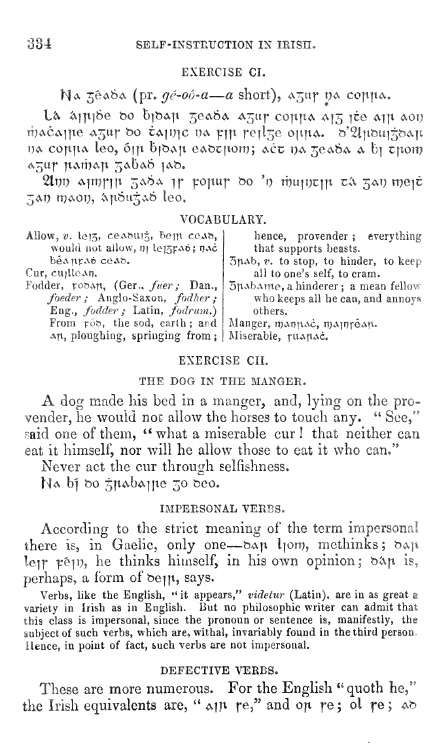
334
SELF-INSTRUCTION
IN
IRISH.
EXERCISE
CI.
H<v
5&<n6<v
(pr. gé-oó-a
—
a short),
a5u]*
t)A
co|i]tA.
Liv
iv]|i]6e bo
bibA|i jeAÓ^. A5U|'
co|1]ia
a|5 ^ce
Aijt
Aor)
njACAitie
A5U|-
bo
CA|qc
ua
^nt reil5e
o|t]tA.
b'2liibu]3bA|i
T)<v
co]t|tA leo, ó]|i b|b<N|t
eAbc]^on);
acc t)a
5eA6A
a
b]
cfiort}
A5Uf
|tArT)A|l 5AbA6 ]Ab.
2lr)t)
A]n)|*]|i
5a6a
if
fojiuf
bo 'tj
Tr)uii)C]|i
z'<\
5AIJ
rtjejc
5At)
n)AOi?,
íx|t6u5A6 leo.
VOCABULARY.
Allow,
V.
Iei5,
ceA&ui5,
bem
ceAb,
i
hence,
provender
;
everything
would
not allow,
d) lejSFAó;
dac
that
supports beasts.
beATXpAc
ceAO.
3riAb,
v. to stop, to hinder,
to keep
Cur, cuiUeATj.
Fodder,
iro&ATt,
(Ger.,
fuer;
Dan.,
foeder;
Anglo-Saxon,
fodher
;
Eng.,
fodder;
Latin,
fodrum.)
From
rós,
the sod, earth
;
and
Ay\, ploughing,
springing from
;
all to
one's
self,
to cram.
5nAbAitie,
a
hinderer
; a
mean fellow
who
keeps all he
can, and
annoys
others.
Manger,
njAt^ttAc,
n)A]T)réATX.
Miserable,
fUAitAc.
EXERCISE
CIL
THE
DOG IN
THE
MANGER.
A dog
made his bed
in
a manger, and,
lying
on
the
pro-
vender,
he wouid
not allow the horses
to
touch any.
"
See,"
said
one of them,
"
what
a
miserable
cur
! that neither
can
eat
it
himself, nor
will
he
allow those
to
eat
it who can."
Never act the
cur through selfishness.
Ma \y\
bo
5|iAbA]jte
50
beo.
IMPERSONAL VERBS.
According
to
the
strict meaning of the
term impersonal
there
is, in
GaeUc,
only
one—bAjt
lion?,
methinks; bAji
Xeyx
y^^i
he
thinks
himself,
in his own
opinion;
bii|t
is,
perhaps,
a
form of
beijt,
says.
Verbs,
like
the English,
"
it
appears," videtur (Latin), are in as great
a
variety
in
Irish as in English.
But
no
philosophic
writer can admit that
this
class
is
impersonal,
since
the
pronoun or sentence is,
manifestly, the
subject of
such verbs,
which are,
withal, invariably
found
in the third
person.
Hence,
in
point of
fact, such verbs
are not impersonal.
DEFECTIVE
VERBS.
These
are
more
numerous.
For
the
English
"quoth he,"
the
Irish
equivalents
are,
"
Ajjt
r^,"
and
o|i
^e;
ol
fe;
Ab
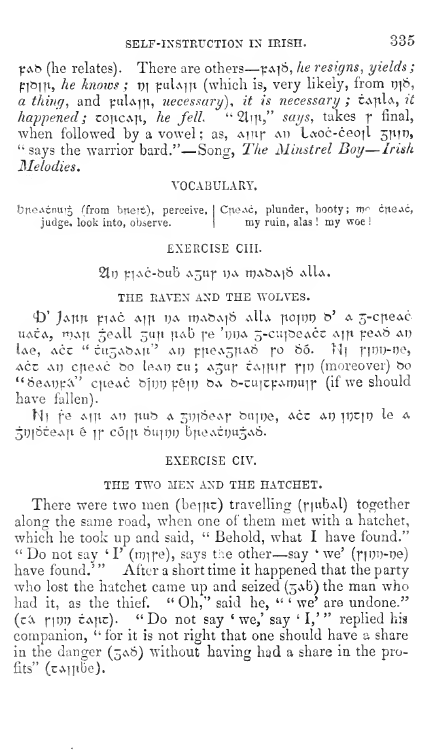
SELF-INSTRUCTION
IN
IRISH.
335
^Ab
(he relates). There are others—
-pAió,
he
resigns,
yields
;
f:]&]|x,
he knows
;
v]
^uIahi
(which is,
very
likely,
from xj^ó,
a thing, and
^rulA^jt, necessary), it
is
necessary
;
ca|iIa, ?i
happened;
coTtcAjx,
he
fell
"
2li|i,"
says,
takes
x
final,
when
followed
by a
vowel
;
as,
Ainr
<^n
LAOc-ceojl 3|t]n,
"
says
the warrior bard."
—
Song,
The
Minstrel
Boy
—
Irish
Melodies.
VOCABULARY.
bneAcnui5 (from
bneit),
perceive, I
C^;^e:^c, plunder,
booty;
rryo
cfieac,
judge,
look into, observe.
1
my ruin, alas !
my
woe !
EXERCISE cm.
2lt)
]:^AC-!3ub
A5U]* T)A
rt^AbAiO
aUa.
THE
RAVEN
AND THE
WOLVES.
<t)'
J
Attn
^lAC
Ajjt r)A
TT)Ai)Ai6
aIU
^}0\r)\) b' A
3-c|ie<xc
UACA,
niA|v
5e<\ll
5u|i
TXAb
fe
'i)iM
5-cii]aeACc
A]|t |:eA6
At)
ÍAe, Acc
"
cu5AbAn'^
at?
p|teA5]tA6
fo
66.
t<l| fir)T)-ne,
Acc
AT)
cfieAc
&o
leAi) cu;
a^ui-
rA||t]r
H^
(moreover)
ho
"6eAi)piv"
cjieAC bp)!)
fé|T)
bA b-cu]cpArr)U]f
(if
we
should
have
fallen).
H]
fe
A]]t AT)
jiub
A
^DióeAT"
bu]t)e, acc
ai)
\r)z\\)
le a
5t)lóceA]t
é
]X
có[|x 6ii]T)i) b|teAci)u5AÓ.
EXERCISE CIV.
THE
TWO
MEN AND THE HATCHET.
There were two
men
(bei|tc)
travelling
(f
lubAl) together
along the
same road,
when
one of them met
with
a
hatchet,
which he took
up and said,
"
Behold, what I
have
found."
"
Do not say
'
I'
{\r)}X^),
says the other—say
'
we'
(fi
t)i)-T)e)
have
found.' " After
a
short
time it happened
that the party
who lost the hatchet came
up and seized
(5Ab) the man who
had
it,
as
the thief.
"
Oh," said
he,
"
'
we'
are undone."
(r^
nT)T)
CA^ic).
"Do
not
say
*
we,' say
'I,'"
replied
his
companion,
"
for
it is
not right
that one
should
have a share
in
the
danger
(5A6)
without having
had
a
share
in the pro-
fits"
(cA]]ibe).
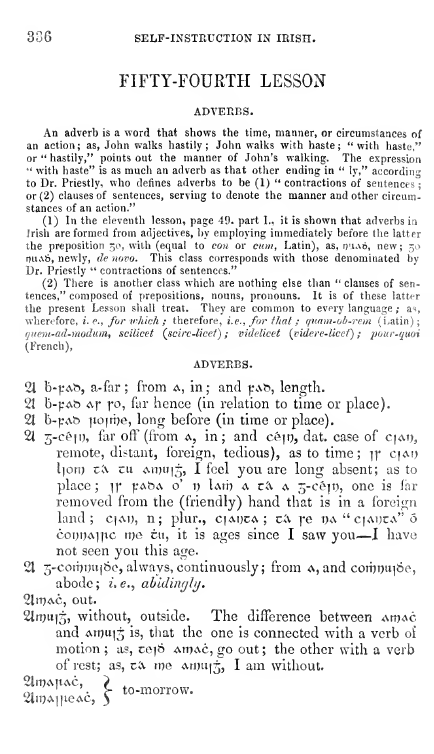
336
SELF-INSTRUCTION IN lEISH.
FIFTY-FOURTH
LESSON
ADVERBS.
An
adverb
is
a word that shows
the time, manner,
or
circumstances
of
an
action
; as,
John walks hastily
;
John
walks with
haste
;
"
with
haste,"
or
"
hastily," points out
the manner of John's walking.
The
expression
"
with haste" is as much an adverb as
that other
ending in
"
ly,"
according
to Dr.
Priestly,
who
defines
adverbs
to
be
(1)
"
contractions
of
sentences
;
or
(2)
clauses
of sentences, serving to denote the manner
and
other
circum-
stances
of an
action."
(1)
In
the eleventh lesson, page
49,
part
I.,
it
is
shown
that
adverbs
in
Irish
are
formed
from
adjectives, by employing
immediately before
the latter
the
preposition
50,
with (equal to con or cum, Latin),
as, ti'iAó, new;
50
nuAó,
newly,
de novo. This class corresponds
with
those
denominated
by
Dr.
Priestly
"
contractions
of
sentences."
(2)
There
is another class which are nothing
else
than
"
clauses
of
sen-
tences,"
composed of prepositions, nouns, pronouns. It is of
these latter
the
present
Lesson shall treat. They are common to every language
; as,
wherefore, i.e.,
for
which
;
therefore,
i.e.,
for
that
;
quam-ob-rem
(ijatin);
qiiem-ad-modum,
xcilicet (scire-licet)
;
videlicet (videre-licet)
;
pour-qitoi
(French),
ADVERBS.
21
b-|:Ab, a-far
;
from
a,
in
;
and
f
A&, length.
21
b-pA&
Aj'
xo,
far hence
(in relation
to time
or
place).
21
b-^Ab
|iO]ri7e, long
before (in
time or place).
21
5-cé|t), far
off
(from
a,
in; and
ce^r),
dat. case
of
C]mj,
remote,
distant,
foreign, tedious),
as to time
;
]Y
C|ai)
l]orr)
civ cu
Arnui5,
I
feel
you are long
absent; as
to
place
; ]Y
^a&a o'
v
\<sw
a
civ
a
3-cé]i}, one is far
removed
from
the (friendly) hand
that is in
a
foreign
land
;
C|A1), n
;
plur.,
ciai)ca
;
cic
ye
i)a
"
ciauca"
5
coi)i)A]itc
rrje cu, it is
ages
since
I saw you
—
I have
not
seen
you this
age.
21
5-corbi)uióe,
always,
continuously;
from
a, and corbpuj^e,
abode;
e,
e.,
abidingly.
2ln)AC,
out.
2lrr>u]5,
without,
outside. The
difference
between Att^AC
and
ATr)ii]5
is, that the
one is
connected
with
a
verb oi
motion
;
as, ce]8 ArnAc,
go out
;
the
other
with a
verb
of rest;
as, c<v
me
An)u|5,
I
am
without,
en
•
^
to-morrow.
2lir)Ai|ieAC,
5
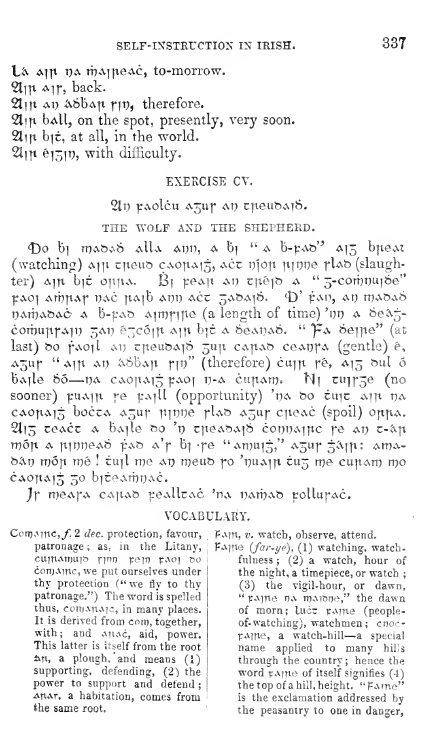
SELF-INSTEUCTION
IN IKISH.
337
La
A.-]]i T)A rpATjieAC,
to-morrow.
2liti Aif,
back.
21]
it
AT)
íx6bA|t
TIT),
therefore.
21
lit
bAll, on the
spot,
presently,
very soon.
2lifi
bjc,
at
all, in
the
world.
2l||t é]5]Tj,
with difficulty.
EXERCISE CV.
2lr)
^Aolcu
A5uf
AT) cjteu&AiS.
THE WOLF AND
THE SHEPHERD.
i)o
bi
r^<^!5^^6 aUa
AT)t}, a b^ "a
b-^Ab'^
ai3
bjteAi
(watching)
Ai|t
cjteub
cA0]tAi5,
acc
rjíojt
]tiT)r)e
rl^b
(slaugh-
ter) AjTi
bjc
o|t|iA.
B|
T^eAji
Ai) c]té]& A
"
5-con9r}uj6e"
^AOl
ATb|tA|*
r)AC
Jl<V]b
AT)r) ACC
5AbA^6.
«D'
f
Al), At)
TT^AbAÓ
TjATTjAbAÓ A
b-pAb
AjmHT^^
(^-
length of time)
'ut)
a 66^5-
corbuftfAii)
jAi) é5có]]t
A]Ti
b]C A ÓeArjAÓ.
"
pA
Oe^fie"
(at
last) bo
T^AOil
AT)
c|teubA]ó
5uii
cAjtAb cev\T)]-A (gentle)
é,
A5U}*
"
AiTi
AT)
X\6bAfi
f]T)"
(therefore)
cu]|i
fé,
A15
but
5
bA]le
60
—
T)A
CA0iaAi3
fAO]
t)-a cu|tArT).
M]
cu]|'5e
(no
sooner)
f:uv\i|t
ye
f-*v^1ll
(opportunity)
't)a bo ciqc
a^^ t)a
CA0|tAi5
boccA A5u|*
|iTr)T)e
flAb
A5Uf
cjieAC
(spoil) 0|i|tA.
2I15
ce<\cc
A
bv\]le bo 't)
c|ieAbAi6 coT)T)Ai]tc |*e
at)
c-ivjx
TDÓ|i A
|t]T)T)eA6
-pAb
a'i*
b] -j-e
"atdii|5,"
a5U|'
5^111:
atda-
bivT)
rr)ó|t TT)é
!
cu]l
Ti)e at) TT)eub
|*o
'T)UA^]t CU5
n)e cu|tArr)
rrjo
CA0|tA]5
50
b|CeArbT)AC.
]y
TT)eAi*A
CA]tAb peAllcAC 't)A
T)ATT)Ab
toUufAC.
VOCABULARY.
ConjAinc,/. 2 <7ec. protection, favour,
,
pAm,
». watch,
observe, attend.
patronage
; as,
in
the Litany,
cuinAnjui»
i-]T)n
peir)
pao]
do
conjAinc,
we
put
ourselves under
thy
protection
("we fly to thy
patronage.")
The
word
is spelled
thus,
con)v\TiAic,
in many
places.
It
is derived
from
cottj,
together,
with
;
and
AtiAc,
aid,
power.
This latter
is itself
from
the
root
ftn.
a plough,
'and
means
(1)
supporting,
defending,
(2)
the
power
to
support
and
defend
;
AtiAf, a
habitation,
comes
from
T^A]rie
(Jar-ye),
(1)
watching,
watch-
fulness
;
(2)
a
watch,
hour
of
the night,
a timepiece,
or watch
;
(3)
the
vigil-hour,
or
dawn,
"
pAine
HA TTjAi&oe,"
the
dawn
of
morn;
lucr
irAine
(people-
of. watching),
watchmen ; cnoc-
pAjne,
a
watch-hill
—a special
name
applied to
many
hills
through
the country; hence
the
word
rAine
of itself
signifies
(4)
the top
ofa
hill,
height.
"PA^ne"
is the exclamation
addressed
by
the
same
root.
the peasantry
to
one in
danger,
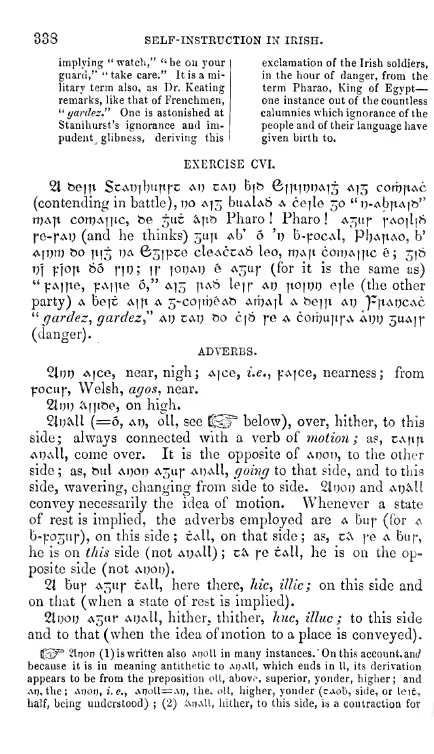
338 SELF-INSTRUCTION
IN IKISH.
implying "watcb,"
"be on
your
guard,"
"
take care."
It is a mi-
litary term also, as Dr. Keating
remarks, like that
of Frenchmen,
"
yardez." One
is
astonished
at
Stanihurst's
ignorance and im-
pudent^
glibness, deriving
this
exclamation
of the
Irish
soldiers,
in the
hour of danger,
from
the
term
Pharao, King
of Egypt
—
one instance out
of
the
countless
calumnies which
ignorance
of
the
people and
of their
language
have
given
birth to.
EXERCISE CVI.
21
&ei|i
ScAT)ibii|irc
At)
CA1)
b]b
6i|t]r)r)A]3 A]^
coit|iAC
(contending
in battle), t)0
a]5
biiAUo a
ce]le
50
"r)-Ab|tAib"
n)A]t corrjAi^ic,
be
5116
ivfib
Pharo
!
Pharo
!
a^ui*
]*ao]1|8
I-e-f
Ai) (and he
thinks)
5u|i
Ab'
ó
'i)
b-pocAl,
PbA|tAO,
b'
Aftjit)
bo
|ti5
u<v
B5ipce
cleACCAÓ
leo,
Tt7A|t
coxx)<s.\y.c
é;
516
ry\ ^joji
ÓÓ
X}^'y
IT
pTM')
é
a5U|*
(for it
is
the
same as)
"]:A]|te,
fAi]te
6,"
A15
|t<\6
le|f
Ar)
]toiT)r>
e^le (the
other
party) a
bejc
ai|i
a
5-co|ri7&Ab
Arr)A]l
a be^yt
At)
"pitArjcAc
*'
gardez,
gardez,'^ at) cat;
bo
0)6
]*e
a
cori^uftj-A
Árju
5UA)f
(danger).
ADVEEBS.
2li)t)
A|ce, near, nigh;
Aice,
i.e.,
fA]ce,
nearness;
from
•pocu|*, Welsh,
aí705, near.
21
1)1)
<xi|ibe,
on high.
2li)<vU
(=0,
Ai),
oil,
see
^p°
below), over,
hither,
to
this
side; always connected
with
a
verb of
motion;
as,
cAjift
at)aII,
come
over.
It is
the opposite of
aoot),
to the
other
side
; as,
bul Atjoi)
A5uf
adaU,
going to
that
side,
and to
this
side,
wavering, changing
from side to side.
2luot)
and Ai;ivll
convey necessarily
the idea
of motion.
Whenever
a
state
of
rest is
implied,
the
adverbs employed are
a
hny
(for
a
b-pojuf),
on this
side
;
caU,
on
that
side
;
as,
c<\
ye a
buf,
he
is on
this
side (not
ai)aII)
;
civ
fe
caU,
he is
on
the
op-
posite side (not
adoi}).
21
buf A5uf
caU, here
there,
hie, illic;
on this
side
and
on
that (when
a
state of rest is implied).
2li}0i) A5ar
At)AU,
hither, thither, hue, illue
;
to this side
and to that
(when the idea of motion to
a place is
conveyed).
55^
2lnon
(1)
is
written
also
ArjoU
in many
instances.
On
this account,an(/
because it is in meaning
antithetic
to
aijaU, which
ends in
U,
its
derivation
appears to be
from
the
preposition
oil,
abov.', superior, yonder,
higher
; and
AT), the; Ation, i.e.,
AnoU^^ATj,
the,
oil, higher, yonder (cAob,
side,
or
leic,
half, being understood)
;
(2)
;^oaU,
hither, to this
side, is a
contraction for
